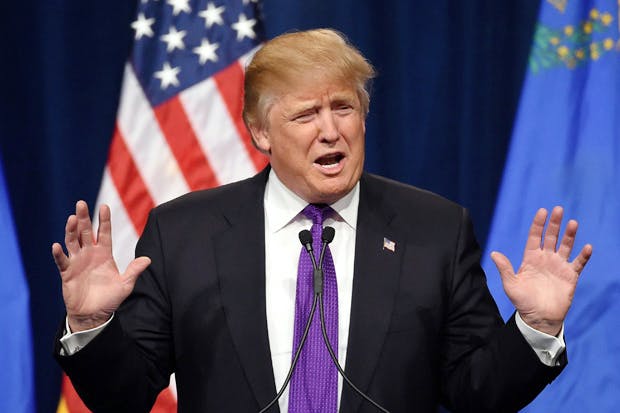There are still four months to go before the vote, but I already feel quite exhausted by the Europe referendum campaign. Such has been the excitement in the British press that I have taken to starting the day by reading the New York Times online, which is so uninterested in this historic matter that it never seems to mention it at all. Monday’s British papers, announcing Boris Johnson’s defection to the Brexit camp, provided the kind of coverage you’d expect if the country had just won a war. Indeed, the Daily Telegraph looked exactly as if it had, with most of its front page, including its logo, consumed by an enormous colour photograph of a triumphant, smiling Boris acknowledging the applause of an invisible crowd. He looked a bit like Churchill on VE Day.
Most other papers had Boris on their front pages too, but the Times, for example, showed him looking like a frenzied, jutting-jawed rabble-rouser. I might have taken these choices of photo as first indications of which side each paper would eventually take in the referendum, had not the Daily Mail, which seems already to be heading inexorably for Brexit, decided to use the same repulsive photo of Boris as the Times.
In any event, the Brexit campaign has got off to a flying start. It has acquired convincing leaders in Boris and Michael Gove, who see it as a home for the bold and the free, those ready to take risks, who believe that Britain can be great on its own again. Those arrayed against them are portrayed as wimps and cowards, with no faith in their country, or members of a secretive establishment bent on survival and self-enrichment, whatever the cost to the rest of us. The more that groups of bankers and businessmen come out publicly against Brexit, the greater the chance will be of it happening.
One of the problems for those, like David Cameron, campaigning to stay in is that they do not themselves believe in the ideals that inspired the founders of the European Community in the first place — an end to European wars being the main one — and therefore have no arguments to offer in favour of membership other than what are in effect forms of scaremongering. And Cameron feels obliged to moderate even this by conceding that Britain would be able to cope perfectly well, whatever the outcome of the referendum.
In the old days, many of those who opposed membership of the EU were Atlanticists who wanted Britain to stay, for the sake of its safety and prosperity, closer to the United States than to the other countries of Europe. But we don’t hear from them any more. Nobody is urging us to snuggle up to the Americans. And this may not only be because of a patriotic conviction that we’d manage very well on our own. It could also be because America has seldom felt more alien than it does now. If the anti-establishment revolt in the US results in the election of Donald Trump as President, we may be surprised at how pro-European we start to feel.
Perhaps I should come clean. I would like Britain to remain a member of the EU because I still like the idea of it, whatever its faults, and I like to feel accepted by other Europeans as being what I think I am —namely one of them. But how to ensure that the referendum goes the way I would like? I don’t think Cameron or George Osborne will be of much help, though I think that Alan will give the other Johnson a good run for his money.
But scaremongering is clearly the way ahead, and I rest my hopes mainly on Nicola Sturgeon. Not only is she popular and a good campaigner; she has in her armoury the scariest weapon of all. This is her threat, quite justified in my opinion, to call for another referendum on Scottish independence if Scotland votes to stay in the EU and the UK as a whole votes to leave. William Hague wrote in the Daily Telegraph this week of his ‘strong belief that if the UK leaves the EU, Scotland is much more likely to leave the UK’. I agree with him; and I also agree with what he said next: ‘How would we feel about freeing ourselves from Europe if our own country disintegrated as a result?’
Got something to add? Join the discussion and comment below.
Get 10 issues for just $10
Subscribe to The Spectator Australia today for the next 10 magazine issues, plus full online access, for just $10.














Comments
Don't miss out
Join the conversation with other Spectator Australia readers. Subscribe to leave a comment.
SUBSCRIBEAlready a subscriber? Log in